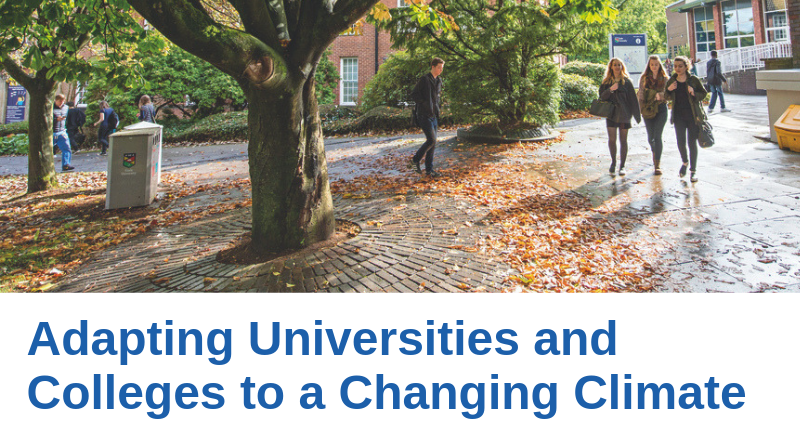Climate Change Adaptation
Climate change is not only a risk in itself to operational, teaching and research activities, but also a multiplier of many other risks. It is vital that considerations of climate change risks and how these risks can be minimised (through adaptation actions), do not become siloed within the remit of Sustainability or Estates Teams.
Developed by a Working Group of FHE sustainability and risk professionals, led by EAUC and HEBCoN (the Higher Education Business Continuity Network) with the support of adaptation specialists from AECOM, two Guides published in summer 2019 highlight why, and how, to effectively embed considerations of climate change risk within your existing risk and business continuity procedures.
The main guide, Adapting universities and colleges to a changing climate: Making the case and taking action, provides a range of support, from an initial self-assessment on climate readiness and an example Elevator Pitch to use to communicate the need for investment in adaptation, to climate projections, examples of risks, opportunities and potential adaptation actions, and a compilation of resources to support action in your institution.
An accompanying guide, Using an existing organisational resilience framework to develop a Climate Change Adaptation Plan, provides advice on embedding climate change risks within existing risk and business continuity procedures at your institution. This guide provides step-by-step advice on running your own Business Impact Analysis workshops to evaluate the risks presented by climate change to key organisational functions, and deciding on the necessary actions to take to reduce any significant risks. The document presents a seven step process to develop a Climate Change Adaptation Plan (CCAP).
Additionally, case studies and example Adaptation Strategies and other relevant documents from universities and colleges around the UK are collated to provide further support. These can be found on the Sustainability Exchange.
Developed by a Working Group of FHE sustainability and risk professionals, led by EAUC and HEBCoN (the Higher Education Business Continuity Network) with the support of adaptation specialists from AECOM, two Guides published in summer 2019 highlight why, and how, to effectively embed considerations of climate change risk within your existing risk and business continuity procedures.
The main guide, Adapting universities and colleges to a changing climate: Making the case and taking action, provides a range of support, from an initial self-assessment on climate readiness and an example Elevator Pitch to use to communicate the need for investment in adaptation, to climate projections, examples of risks, opportunities and potential adaptation actions, and a compilation of resources to support action in your institution.
An accompanying guide, Using an existing organisational resilience framework to develop a Climate Change Adaptation Plan, provides advice on embedding climate change risks within existing risk and business continuity procedures at your institution. This guide provides step-by-step advice on running your own Business Impact Analysis workshops to evaluate the risks presented by climate change to key organisational functions, and deciding on the necessary actions to take to reduce any significant risks. The document presents a seven step process to develop a Climate Change Adaptation Plan (CCAP).
Additionally, case studies and example Adaptation Strategies and other relevant documents from universities and colleges around the UK are collated to provide further support. These can be found on the Sustainability Exchange.











